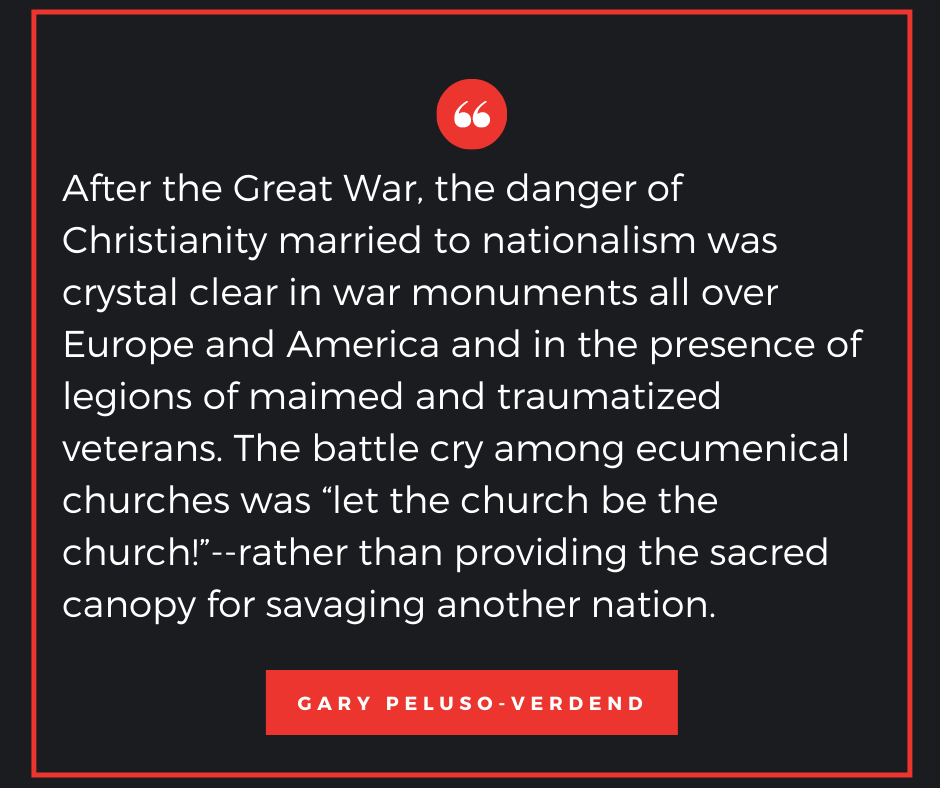History is Not Linear. It is Not Even Quite Cyclical.
Movements and ideas travel history in loops that end in different places from where they began. Sometimes the loops are virtuous and sometimes they are vicious. Today, I am afraid vicious loops are intensifying and tightening. We in the 21st century seem intent on repeating 20th century conflicts with the addition of climate destabilization, instantaneous worldwide communication, social media-compounded fear and righteous rage, and weapons of mass destruction.
A clergy friend and I were talking yesterday. He rightly reminded me that the Christian narrative centers on Good Friday through Easter Sunday. My retort, “But will humankind ever make it past Friday or, on a good day, Saturday?”
The early 20th century was marked by Western nations ensconced in ethno-nationalism, energized by founding myths and imperial versions of Christianity, fighting for land and natural resources and cheap labor.
 Even the world’s allegedly most advanced democracy, the United States, distrusted democracy as evidenced by voting restrictions and prohibitions. But perhaps more than distrust of democracy, our nation was characterized by a distrust of the federal government. In terms of culture, race, religion, and states’ rights, the Civil War has never really ended. Here in the early 21st century, we are very familiar with this distrust of democracy.
Even the world’s allegedly most advanced democracy, the United States, distrusted democracy as evidenced by voting restrictions and prohibitions. But perhaps more than distrust of democracy, our nation was characterized by a distrust of the federal government. In terms of culture, race, religion, and states’ rights, the Civil War has never really ended. Here in the early 21st century, we are very familiar with this distrust of democracy.
Today, Metropolitan Kirill of Moscow provides a sick sacred canopy to Vladimir Putin’s cruel and inhumane and illegal war on Ukraine. Kirill claims the war is necessary to cleanse civilization of its western modernist elements, especially everything associated with the United States. Here in the United States, one version of Protestant Christian evangelicalism proffers itself as the church.
This version of evangelicalism has shed core convictions about Jesus being Lord, a literal interpretation of scripture, the necessity of a conversion experience, and maintaining a personal relationship with Jesus. From a progressive Christian point of view, it is difficult to find much religious within this political identity version of evangelicalism, except for its God claims. It is Christianity in service of empire and all the actions an empire takes to protect its borders and shape the world in its image.
In the early 20th century, Protestant Christian churches in the West began to seek expression for movements of unity. Evangelize the world in this generation. Learn to cooperate rather than compete in the mission field in order to avoid importing the conflicts that roiled Europe for centuries. Activate the gospel to promote social justice and to show Christianity has answers to the world questions and solutions for the problems of modern life.
These churches were relatively blind to the tensions that resulted in World War I. Their vision was a little less occluded in between the wars. After the Great War, the danger of Christianity married to nationalism was crystal clear in war monuments all over Europe and America and in the presence of legions of maimed and traumatized veterans. The battle cry among ecumenical churches was “let the church be the church!”–rather than providing the sacred canopy for savaging another nation.
Christians from many lands were instrumental in building institutions after the Second World War that, it was hoped, might foster the relationships and be given the authority to prevent World War III and to weave a more just world order. The United Nations, especially its Declaration of Human Rights, would not have happened without Christian leadership. There was cross fertilization between the ecumenical movement, in both its regional and international expressions, the UN, and movements for peace and justice–including the civil rights movement in the US.
Today, it is inconceivable that either the United Nations or the World Council of Churches could be created. Not in 2022. Inconceivable.
Thirty years ago, political scientist Francis Fukuyama declared the end of history. With the demise of the USSR, liberal values, capitalism, free markets, and democracy had triumphed. Authoritarianism was in the cemetery.
Oh my. What a difference 30 years makes. Liberalism and its attendant values of free speech, globalization, and dissent have slid into disrepute. Religious nationalism promoted by authoritarian leaders is once again ascendant.
What will the next 30 years bring? Will the next cycle of history turn virtuous or stay vicious? And will Christian churches re-assert their prophetic voices and distance from the state or will they lose their souls in exchange for the supreme ruler’s ear and ego? Time will tell.
Dr. Gary Peluso-Verdend is president emeritus at Phillips Theological Seminary and is the executive director of the seminary’s Center for Religion in Public Life. The opinions expressed in this blog are those of the author. Learn more about the Center’s work here and about Gary here.


Comments are closed.